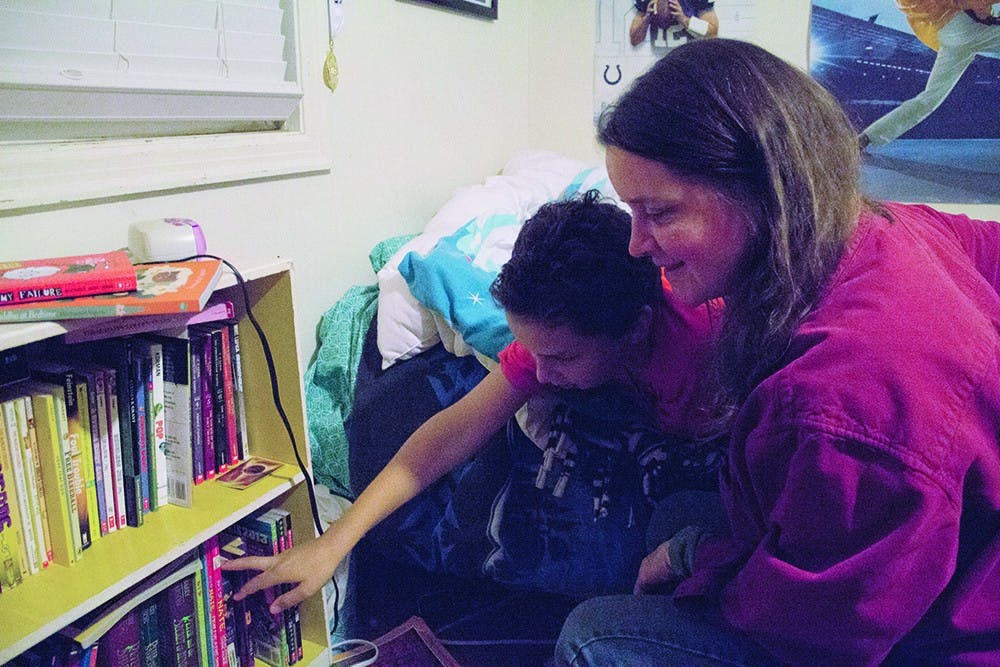INDIANAPOLIS — Cathy Fuentes-Rohwer is in mama bear mode.
She fumes from her bench in the Indiana Statehouse where she’s been sitting for nearly eight hours waiting to testify. The meeting, called so legislators and advocates could speak about the teacher shortage in Indiana, began at
1 p.m.
She’s here to share her testimony as both a parent and the chairperson for the Monroe County Coalition for Public Education — to make the committee think about her kids and her kids’ teachers, even though she said she believes many legislators don’t listen.
By 8:20 p.m., Fuentes-Rohwer, a 47-year-old Bloomington resident, still has not gotten to speak, and her anger is compounded by what she calls “mommy guilt.”
She’d told Mateo, her youngest son, that she’d be home in time to break in their new fire pit and make s’mores. She stares at her phone. Her husband just sent her a picture of the fire.
Finally, the meeting’s chair, Sen. Dennis Kruse, R-Auburn, calls her to speak. It’s about 8:30 p.m.
“Cathy Fuentes Roar-wher?” he says and mispronounces her last name.
“Rohwer,” she says. “Thank you.”
She turns to face the room. It was full before, but now, nearly everyone has left. There are maybe four legislators and six or seven people still sitting in the audience.
Her anger gives her bravery and resolve as she speaks to a nearly empty room.
***
Indiana is facing a crisis — a shortage of teachers in classrooms. There are barely enough fresh faces to fill vacated spots.The Indiana Department of Education issued 3,802 teacher licenses in the 2014-15 school year — 21 percent fewer than last year and 33 percent fewer than in 2009-10.
Fuentes-Rohwer said the bad news began at a national level when a narrative began to form that American public schools were falling behind.
Then, Fuentes-Rohwer said, the issue was exacerbated with the implementation of No Child Left Behind and Race to the Top. The former, a congressional act, required states to develop standardized tests of basic skills. The latter, a federal competitive grant, distributed $4.35 billion among states that proposed reforms. But those reforms, critics say, led to more high-stakes testing, undercut teachers’ autonomy and diverted resources away from struggling students and into charter schools.
In Indiana, Fuentes-Rohwer said, the turning point was when then-Gov. Mitch Daniels and conservative legislators cut $300 million from the state budget for
public education.
Fuentes-Rohwer has noticed a change in schools just from watching her own kids pass through the system.
When her oldest son, Tomas, was in third grade, he learned to read at his own pace. When Mateo was in third grade, Fuentes-Rohwer said he worried about whether or not he’d get to move with his friends to fourth grade. He first had to pass the IREAD-3 — a state-mandated reading test for
third-graders.
Fuentes-Rohwer graduated from Eastern Michigan University with a master’s degree in social foundations of education. Although she taught preschool while studying, she never made it into the classroom after that because she and her husband had Tomas while they were still students.
She spent her years after college being a mom until she was called upon to be a leader.
In 2010, about 15 years after Fuentes-Rohwer got her master’s, teachers lost their stipends for extracurricular activities due to state budget cuts. Fuentes-Rohwer, now a mom of four, went to meetings as the community rallied to raise the money with a referendum.
She started going to local school board meetings, then state ones.
In 2011, a group of current and retired educators asked her to help start a local chapter of the Indiana Coalition for Public Education.
She was wary at first, but she acquiesced. She wanted education to be the promise of social equality she thought it was meant to be.
During the past four years, she shared her testimonies in forum after forum. Even so, during the ride to the Indiana Statehouse on Monday, Fuentes-Rohwer said she felt nervous. She fell asleep at 11:30 the night before but woke up at midnight in a panic.
‘What the hell am I doing?’ she had thought. I haven’t written a thing.’
She got up to write from her stream of consciousness. She edited, slept, woke up at 6 a.m., edited again.
Despite the nervousness she said she was looking forward to seeing her friends. She wouldn’t have to testify alone. She rode with a friend who teaches in Bloomington and they met up with some advocates from Fort Wayne, Indiana.
Without them, she said she might have bagged it all and decided to run soccer carpool instead.
***
Fuentes-Rohwer’s friends from Fort Wayne belonged to the Northeast Indiana Friends of Public Education, an advocacy group. They wore neon green crewneck sweatshirts. Green spot after green spot, surrounded by state senators and representatives clad in blazers, ties and button-ups, they were beacons of color among the grays and blues.
The first four hours of the meeting dragged, stuffed with data and speculation.
Fuentes-Rohwer listened to state superintendent Glenda Ritz cite irrefutable data from recent research. Fuentes-Rohwer said she felt validated she had worked so hard to get Ritz elected.
By 4:30 p.m., no one from the public had been allowed to speak, and the green sweatshirts were getting antsy.
Soon after, they left without testifying. The sea of blues, grays and blacks was now interrupted only by the emptiness of unoccupied seats.
Fuentes-Rohwer said she was angry. Her friends and fellow advocates hadn’t been able to share their testimonies — the testimonies into which they’d poured their hearts.
Around 5:15 p.m., almost 4 1/2 hours after the start of the meeting, the first public speaker was called.
Many public speakers were current or former teachers, lamenting on their daily struggles.
Rep. Melanie Wright, D-Yorktown, a teacher at Daleville Community Schools, became a state representative because she wanted to lift some weight off her students’ shoulders. When she began to speak, her voice shook.
“It’s with a heavy heart I offer up this testimony,” Wright said.
Her audience was subdued, a lull after hours of data recitation.
“I haven’t had one educator who’s said that they didn’t want accountability or they didn’t want to make things better,” she said. “That they didn’t want to change, they didn’t want to be responsible for what they offered to
students. Not one.”
She held up a determined and steady finger, but her deep, shaky breath betrayed her.
People were paying
attention now.
She said her colleagues retired because they couldn’t keep up with the changes.
Her voice snagged.
“And I say that with a heavy heart, because it’s very focused on testing,” she said, chin trembling. “If you’ve not been in a classroom since 2011, I ask you to go look in a classroom, just for three days And just sit and watch.”
Across the room, Fuentes-Rohwer noticed something: Rep. Robert Behning, R-Indianapolis, the vice chair of the meeting, turning away from Wright in her moment of vulnerability. He appeared to be rifling through papers. She wondered if perhaps he was checking to see how many speakers were yet to come.
Fuentes-Rohwer took out her phone and captured the moment — Behning, back turned to a fellow politician’s emotional testimony.
After she finished, Wright received a quick spattering of applause — the first applause of the day, almost like an
absentminded accident.
***
Fuentes-Rohwer was the second-to-last person to speak.
“So ... empty room,” she began, off-script. “But thanks for the few of you that are still here.”
“We’re still on the Internet, so — ” Behning said, referring to the live stream of the event broadcasted online, before Fuentes-Rohwer interrupted him.
“Well I’m hoping somebody’s watching. But at this point” — voice gaining force, glasses in her right hand, tapping them at Behning for emphasis — “you really need to think about this process,” she said, referring to her anger that public testimony was left to the end of the meeting.
She raised her eyebrows while maintaining eye contact. She didn’t know if Behning was looking back at her with anger, amusement or abashment. All she said she could see was her fury — red.
“Parents have not been begging for a better school than their neighbor’s child,” she said. “They’ve been begging for a great school. Period. Parents want equity. Instead, we get competition.”
She made eye contact with Behning several more times, not shying away.
“Competition involves winners and losers,” she said. “No 6-year-old should be a loser when it comes to
educational opportunity.”
When Fuentes-Rohwer returned to Bloomington around 10:30 p.m., she posted her testimony on her Facebook page. By Wednesday morning, it had more than 800 shares.
By the following Monday, Oct. 26, it had 1,060 shares.
But she said Facebook isn’t enough. She’s always striving to find new ways to reach out.
She’s glad she stayed at the statehouse and shared her voice, even if hardly anyone was left to hear it.
The moments when the job is hardest for her to manage are the moments when it interferes with time with Mateo. Those moments with him are precious to her — whether it’s a fire pit or simply reading a chapter book with him before bed. Once, she went to testify at a hearing against the establishment of a charter school in Bloomington and came home to learn Mateo had gotten the game ball in his baseball game. “Look!” he said to her. When he went to shower, she cried.
***
On Sunday night, a week after the statehouse, the Fuentes-Rohwer family had another bonfire.
“Finally got to participate in the bonfire I missed on Monday!” she posted on Facebook with several photos of flames, smiles and toasted marshmallows.
“That is what moms and teachers do for their kids each and every day!!!” a woman commented on the post. “Thanks Cathy!!!!”
Some teachers are afraid to speak up, Fuentes-Rohwer said. She doesn’t have to
worry about that.
As a parent she needs people to know not everything she wants for her kids is quantifiable.
And her voice is strong.






